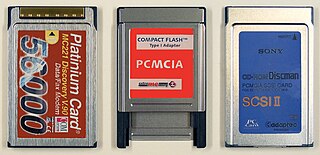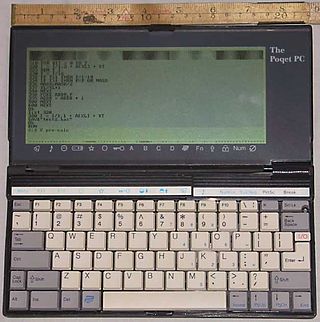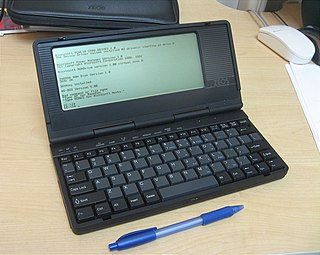Ian H. S. Cullimore is an English-born mathematician and computer scientist who has been influential in the pocket PC arena. [1]
Ian H. S. Cullimore is an English-born mathematician and computer scientist who has been influential in the pocket PC arena. [1]
Cullimore has a degree in mathematics from King's College London, and a PhD in cognitive and computer science from the University of Sussex.
He was the original founder (in 1985) and main inventor of the pocket PC which became the Atari Portfolio (originally known as the "DIP Pocket PC") in 1989. DIP Research Ltd. was acquired by Phoenix Technologies in 1994. [2]
In 1988 Cullimore was also one of the founders and Vice President of Software at Poqet Computer Corporation in Silicon Valley, where he developed the Poqet PC.
His interest in PDAs was sparked from his early times at Psion, working on the first Organiser products.
He was also the original instigator of the PC Card (formerly "PCMCIA Card") movement. This came about from his decision to use the then-emerging credit card memories in the design of the Atari Portfolio. On founding Poqet, and with major investment from Fujitsu, a decision was made to use the 68-pin JEIDA card. He successfully persuaded the board of Poqet to set up an industry standards organization, PCMCIA, to promote this as a standard.
Cullimore wrote parts of the PCMCIA driver stack for (NetWare) PalmDOS 1.0, a variant of Digital Research's DR DOS, tailored specifically at battery powered mobile PCs in 1992. [3]

PC Card is a parallel peripheral interface for laptop computers and PDAs. The PCMCIA originally introduced the 16-bit ISA-based PCMCIA Card in 1990, but renamed it to PC Card in March 1995 to avoid confusion with the name of the organization. The CardBus PC Card was introduced as a 32-bit version of the original PC Card, based on the PCI specification. The card slots are backward compatible for the original 16-bit card, older slots are not forward compatible with newer cards.
The Personal Computer Memory Card International Association (PCMCIA) was an industry consortium of computer hardware manufacturers from 1989 to 2009. Starting with the PCMCIA card in 1990, it created various standards for peripheral interfaces designed for laptop computers.

Digital Research, Inc. was a privately held American software company created by Gary Kildall to market and develop his CP/M operating system and related 8-bit, 16-bit and 32-bit systems like MP/M, Concurrent DOS, FlexOS, Multiuser DOS, DOS Plus, DR DOS and GEM. It was the first large software company in the microcomputer world. Digital Research was originally based in Pacific Grove, California, later in Monterey, California.

The Poqet PC is a line of palmtop PCs introduced in 1989 by Poqet Computer Corporation. The eponymous first model was the first IBM PC–compatible palmtop computer capable of running MS-DOS at CGA resolutions. The Poqet PC is powered by two AA batteries. Through the use of aggressive power management, which includes stopping the CPU between keystrokes, the batteries are able to power the computer for anywhere between a couple of weeks and a couple of months, depending on usage. The computer also uses an "instant on" feature, such that after powering it down, it can be used again immediately without having to go through a full booting sequence. The Poqet PC is comparable to the HP 95LX/HP 100LX/HP 200LX and the Atari Portfolio handheld computers. The computer originally sold for US$2,000; it was discontinued after Fujitsu Ltd. bought Poqet Computer Corp.

ExpressCard, initially called NEWCARD, is an interface to connect peripheral devices to a computer, usually a laptop computer. The ExpressCard technical standard specifies the design of slots built into the computer and of expansion cards to insert in the slots. The cards contain electronic circuits and sometimes connectors for external devices. The ExpressCard standard replaces the PC Card standards.

The FM Towns Marty is a home video game console released in 1993 by Fujitsu, exclusively for the Japanese market. It uses the AMD 386SX, a CPU that is internally 32-bit but with a 16-bit data bus. The console comes with a built-in CD-ROM drive and disk drive. It was based on the earlier FM Towns computer system Fujitsu had released in 1989. The Marty was backward-compatible with older FM Towns games.

The Atari Portfolio is an IBM PC-compatible palmtop PC, released by Atari Corporation in June 1989. It was the first palmtop computer compatible with the IBM PC ever released.

The HP 200LX Palmtop PC, also known as project Felix, is a personal digital assistant introduced by Hewlett-Packard in August 1994. It was often called a Palmtop PC, and it was notable that it was, with some minor exceptions, a DOS-compatible computer in a palmtop format, complete with a monochrome graphic display, QWERTY keyboard, serial port, and PCMCIA expansion slot. The abbreviation "LX" stood for "Lotus Expandable".

A handheld personal computer (PC), typically built around either a clamshell form factor or a gaming form factor with a gamepad integrated for video games, is a mobile device that is significantly smaller than any standard personal computer (PC), but based on the same principles as PCs. The clamshell form factor is sometimes referred to as a palmtop computer, not to be confused with Palmtop PC which was a name used mainly by Hewlett-Packard.

Zeos International, Ltd., was a PC manufacturer based in Minneapolis, Minnesota. Originally based in New Brighton, Minnesota, and founded by Gregory E. Herrick, the company incorporated in Minnesota in 1981. Prior to manufacturing PCs, the company was called NPC Electronics. NPC was a contract assembly business best known for developing a transmitter device called Radio Realty. Marketed primarily to real estate brokers, this product enabled prospective home buyers to tune in and listen to prerecorded information about a property listing while parked in front of the dwelling. Radio Realty was divested in the early 1980s as NPC started developing, manufacturing, and selling PCs under the Zeos name. The company went public in mid-1985 by self-underwriting, and officially changed its name from NPC Electronics to Zeos International.

Phoenix Technologies Ltd. is an American company that designs, develops and supports core system software for personal computers and other computing devices. The company's products – commonly referred to as BIOS or firmware – support and enable the compatibility, connectivity, security and management of the various components and technologies used in such devices. Phoenix Technologies and IBM developed the El Torito standard.

The HP 95LX Palmtop PC, also known as project Jaguar, is Hewlett Packard's first DOS-based pocket computer, or personal digital assistant, introduced in April 1991 in collaboration with Lotus Development Corporation. The abbreviation "LX" stood for "Lotus Expandable". The computer can be seen as successor to a series of larger portable PCs like the HP 110 and HP 110 Plus.

Following the introduction of the IBM Personal Computer, or IBM PC, many other personal computer architectures became extinct within just a few years. It led to a wave of IBM PC compatible systems being released.

A 'Palmtop PC was an approximately pocket calculator-sized, battery-powered computer compatible with the IBM Personal Computer in a horizontal clamshell design with integrated keyboard and display. It could be used like a subnotebook, but was light enough to be comfortably used handheld as well. Most Palmtop PCs were small enough to be stored in a user's shirt or jacket pockets.
Stavro Evangelo "Stav" Prodromou is a Palestinian Greek American businessman, and the founder and former chief executive officer of Poqet Computer Corporation. Prodromou has served as CEO of Alien Technology, Peregrine Semiconductor, and Integrated Circuit Systems and Executive Vice President of Fairchild Semiconductor Corporation.

Batteries Included was a computer software and hardware company based in the Toronto area. It developed products for the Apple II, Atari 8-bit computers, Atari ST, Commodore 64, and MS-DOS. The company was best known in the 1980s for its PaperClip word processor, which was available for the Atari 8-bit family and Commodore 64, and the DEGAS bitmap painting program for the Atari ST. Batteries Included was acquired by Electronic Arts in 1987.

The Zeos Pocket PC is a palmtop PC marketed by Zeos International beginning in 1992. The palmtop features an NEC V30 clocked at 7.15 MHz, came shipped with MS-DOS 5.0 in ROM, and has a monochrome LCD capable of displaying graphics at maximum resolution of 640×200 (CGA). These features make the Pocket PC compatible with most IBM PC software out at the time of its release. The Pocket PC is a badge-engineered version of the Tidalwave PS-1000, manufactured by Tidalwave Microtech of Taiwan. It sought to compete with the Poqet PC, another PC-compatible palmtop computer.
The Sharp PC-3000 was an MS-DOS-based palmtop computer introduced in 1991. The "SPC" was designed and developed by Distributed Information Processing Research Ltd. ("DIP") in the UK. DIP had earlier designed the Atari Portfolio and the two machines shared many design features both in hardware and software.
Pocket PC is a class of personal digital assistant (PDA) defined by Microsoft.